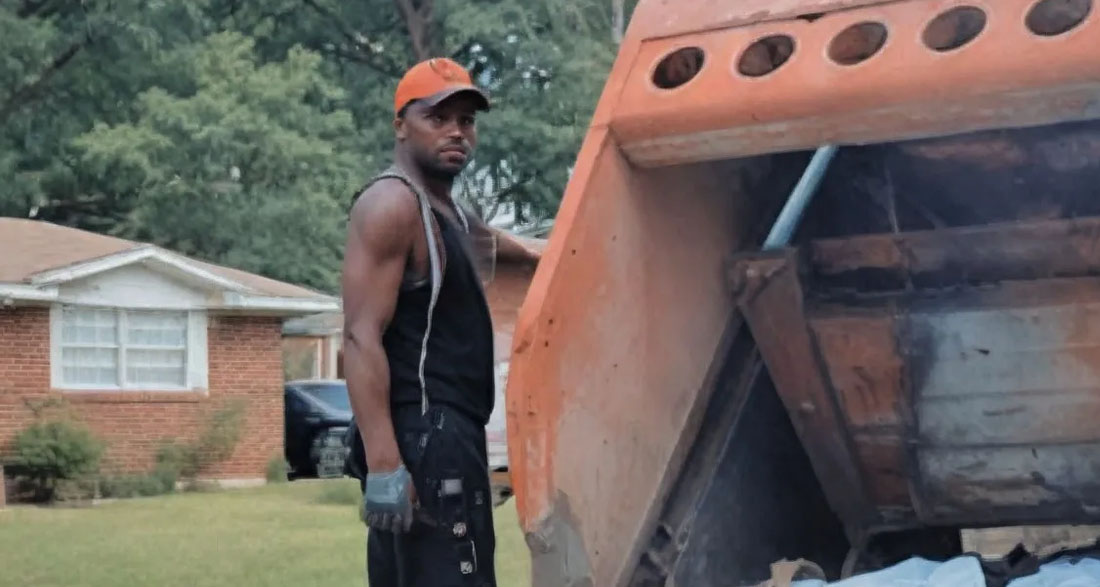It was supposed to be just another regular morning. The garbage truck rolled down the quiet street like always. Birds chirped. Lawns glistened with dew. Most people barely noticed the trash being collected—it was just part of the rhythm of life.
But that day, something caught my attention.
I watched a sanitation worker carefully returning a trash bin—not just to the edge of the sidewalk, like most workers would—but all the way up a short path to the side entrance of a small brick house. He moved with calm purpose, his steps steady, as if every action mattered. He didn’t rush, and he didn’t glance around to see if anyone was watching.
That’s when I noticed an elderly woman sitting on the porch, wrapped in a cozy shawl, a cup of tea resting beside her. Her silver hair was tied back neatly, and she had a gentle smile, the kind that spoke of years lived and stories waiting to be told.
I walked over and asked, “Excuse me, ma’am… that man—he just brought your bin all the way back. Does he do that every time?”
She nodded, her eyes crinkling warmly. “That gentleman? He brings it back for me every week,” she said softly. “Since my husband died, I can’t manage it myself.”
Her words struck me. Something about the quiet respect in how the man moved, and the appreciation in her voice, made my chest feel tight.
I turned to look at him again.
But now, he wasn’t heading back to his truck.
He stood still, frozen, staring at the house.
Not the whole house—just one window.
I frowned. Something felt off.
That’s when I saw it: in the window was an old, black-and-white photograph taped to the inside of the glass. In the picture, a young couple stood proudly next to a shiny new garbage truck. And standing beside them… was a teenage boy.
The sanitation worker looked exactly like the man in the photo. The resemblance was too strong to ignore.
Then came a voice—shaky, concerned—from the porch.
“Malcolm! Is everything okay?”
The man—Malcolm—turned slowly, his eyes still full of emotion. His voice cracked when he spoke.
“Mrs. Calloway,” he said, sounding both stunned and unsure, “is that… is that my father in your photo?”
I saw Mrs. Calloway freeze. Her knitting needles slipped from her hands and clattered to the wooden porch floor.
For a long moment, she said nothing. Then she raised a trembling hand and motioned him forward.
“Come inside,” she whispered. “We need to talk.”
Inside, her home was warm and filled with the scent of cinnamon and old books. Photographs of her life lined the walls, and a soft lamp cast golden light across the cozy room. Malcolm sat down slowly, still visibly shaken.
Mrs. Calloway disappeared into the hallway and returned with a large, worn scrapbook. She carefully opened it, flipping through page after page of old memories. Finally, she stopped. Her fingers gently tapped the plastic sleeve of a photo.
“This one,” she said.
It was another version of the photo in the window—only this time, it showed more. The same young couple were there, beaming. And beside them, without a doubt, was a young Malcolm.
Malcolm stared at the picture, his hands trembling. “I don’t understand,” he said quietly. “Why do you have this?”
Mrs. Calloway’s voice was full of memories. “Your father worked for the city for over twenty years. He was kind, reliable, and always went the extra mile—just like you.” Her eyes filled with tears. “After my husband passed away ten years ago, your father started bringing my trash bin back for me. He never made a big deal out of it. He just did it. Every week. Rain or shine.”
Malcolm nodded slowly, absorbing every word. His father had died when he was just eighteen. So many parts of his dad’s life had remained a mystery. All Malcolm knew was that his father had loved his job and always told him to help others, no matter what.
“I had no idea,” Malcolm murmured. “He never talked much about work, or the people on his route. I thought… I thought he was just doing his job.”
Mrs. Calloway smiled kindly and placed a gentle hand on his. “Oh, dear. He did so much more than just a job. Your father had a gift—he made people feel seen and cared for. Even when no one thanked him, he knew he was making someone’s day a little better.”
Malcolm sat in stunned silence, staring at the photo that now felt like a piece of his own heart. It was more than just a picture—it was proof of something deep and beautiful. A quiet legacy, passed down without words.
Over the next hour, Mrs. Calloway shared stories of Malcolm’s father. How he once shoveled her driveway after a snowstorm without being asked. How he brought her hot soup when she was sick with the flu. How he always waved and smiled, even on tough days.
Each story painted a picture of a man who didn’t just work for the city—he cared for its people.
When Malcolm left her home, his heart was full. It was heavy with grief, but also filled with pride. Now he understood why he had always felt a pull to return the trash cans, even when no one was watching.
It wasn’t just about helping.
It was about connection. About reminding someone they mattered.
That evening, Malcolm drove across town to visit his mother. She lived in a small, tidy apartment filled with plants, puzzle books, and framed family photos. When she saw him at the door, her face lit up with surprise.
“Well, this is unexpected!” she said, smiling as she set her crossword aside. “To what do I owe the pleasure?”
“I found something today,” Malcolm replied, pulling out his phone. He showed her the photo from Mrs. Calloway’s scrapbook. “Do you remember this?”
His mother’s expression softened as she took the phone. “Oh yes,” she said with a faraway look in her eyes. “Those were good days. That was your dad’s first truck. He was so proud of it.”
Malcolm told her everything—about Mrs. Calloway, the photo in the window, and the stories of his father’s quiet acts of kindness.
By the time he finished, his mother’s eyes were glistening with tears.
“You’re so much like him,” she said, squeezing his hand. “He’d be so proud of the man you’ve become, Malcolm. You’ve got his heart.”
In the months that followed, something shifted inside Malcolm. He felt a new sense of purpose—like he had been given a second chance to carry on a tradition he never realized he had inherited.
He began to look at his job differently.
He slowed down, took notice of the people around him. When he saw an elderly neighbor struggling with groceries, he offered to help. If a little kid waved through a window, he made sure to wave back—big and cheerful.
Word spread quickly through the neighborhood. People began leaving little thank-you notes on their bins. Some stuck signs in their yards that said, THANK YOU, MALCOLM! One family even invited him over for dinner and shared stories about their own lives.
And through all of this, Malcolm realized something important: kindness doesn’t just help people—it connects them. A small act could ripple outward and touch lives in ways he might never even see.
Years later, when Malcolm finally decided to retire, the community threw him a surprise party.
Hundreds showed up. Children ran around the park, laughing. Neighbors hugged him, thanked him, shared stories. And there, among the crowd, was Mrs. Calloway—now older, but still full of grace. She handed him a framed collage of photos taken throughout his career. In the center was a message written in bold, loving letters:
“YOUR FATHER WOULD BE SO PROUD.”
Malcolm stood in the middle of that crowd, surrounded by familiar faces and warm memories, and felt something powerful—peace. He had honored his father’s memory. And more than that, he had created something of his own.
Because sometimes, the smallest gestures—a returned trash bin, a wave, a smile—are the ones that last forever.
And when we choose kindness, when we take the time to care, we leave behind more than just good deeds.
We leave behind a legacy.














